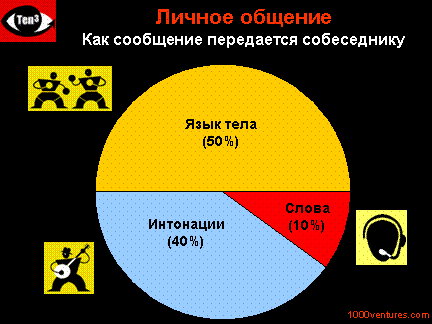|
Effective Listening The Art, Science, and Practice |
|
by Vadim Kotelnikov, Founder, The first-ever BUSINESS e-COACH for Innovative Leaders, 1000ventures.com
"A good listener is not only popular everywhere, but after a while he knows something" - Wilson Mizner
|
Understand and Fulfill Needs of Others One of the golden rules of the therapy profession is that everyone needs at least one person with whom they can openly and unashamedly discuss every little detail - happenings, desires, fears - of their life, whether it is from the past, present, or future. There are other psychological needs - to be accepted unconditionally, appreciated, recognized, respected, desired, valued, approved of, or complimented - that affect the way we communicate with each other. Listen carefully, ask questions to show that you are genuinely interested and you'll be amazed at the spin-offs from becoming a good question asker and a good listener. People appreciate, respect and value others who are great listeners. NLP Solutions: Engage All of Your Senses Most people simply listen to the words that are being said to them, but words contain only 10% of the message. The remaining 90% is hidden in the body language and the tone of voice. Understanding body language can help you look beyond what people say to what they really mean. To remember better what's being communicated to you, try to engage all your senses whilst listening as human brain stores pictures, feelings, smells and tastes more effectively than words. Understand you preferred mode of thinking, your mental map: whether you are a visual ('see' the world), auditory ('hear' the world), or a kinesthetic ('feel' the world). If you are a visual, when you're listening to someone, first of all make what they're are telling you into a movie. As brains remember better things that are out of the ordinary, you can try distorting pictures or making them funny. To enhance the effect, add sounds, link feelings to your movies, put the taste and smells in. And exaggerate everything.3 Barriers to Effective Listening Often we have too much difficulty listening to other people because1:
Active Listening Active listening involves playing back your own interpretation of what has been said in acknowledgement - 'As I see it, what you mean is...' ...More Asking Effective Questions Know which questions to ask - it will help you get the right response.
|
Bibliography:
-
"101 Ways To Generate Great Ideas", Timothy R.V. Foster, 2001
-
"Selling with NLP", Kerry L. Johnson, 2001
-
"Super Communication - the NLP Way", Russel Webster, 2000
-
"Essential Manager's Manual", Robert Heller & Tim Hindle, 1998
-
"How To Be Better at Delegation and Coaching", Tony Atherton, 2000



